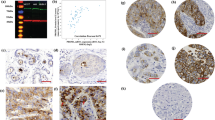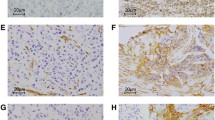Abstract
The aim of this study is to explore the expression of CD109 in breast cancer stem cells and the relationship between CD109 protein and clinicopathological characteristics of breast cancer. CD44+/CD24− tumor cells (CSCs) were selected by flow cytometry. The protein expression of CD109 was analyzed by immunohistochemistry staining, and the relationship between CD109 and clinicopathological parameters of breast cancer was determined. CD109 positively regulated the proliferation of breast CSCs in vitro, and CD109 protein expression was significantly higher in triple-negative breast cancer (TNBC) compared to non-TNBC (63.78 vs. 3.71 %, P = 0.001). Moreover, CD109 protein expression was related to the histological grade of breast cancer (P = 0.015), whereas age (P = 0.731), tumor size (P = 0.995), clinical stage (P = 0.644), and lymph node metastasis (P = 0.924) were not. In the logistic regression model, histological grade (P = 0.001) and molecular type (P = 0.001) were significantly related to CD109 expression. The patients with high expression of CD109 protein had significantly poorer postoperative disease-specific survival than those with no or low expression of CD109 protein (P = 0.001). In the Cox regression, CD109 was an independent prognostic factor (P = 0.001). CD109 is highly expressed in TNBC and is a potential biomarker for the initiation, progression, and differentiation of breast cancer tumors.




Similar content being viewed by others
References
Desantis C, Ma J, Bryan L, Jemal A. Breast cancer statistics, 2013. CA Cancer J Clin. 2014;64(1):52–62.
Wright MH, Calcagno AM, Salcido CD, et al. Brca1 breast tumors contain distinct CD44+/CD24- and CD133+ cells with cancer stem cell characteristics. Breast Cancer Res. 2008;10:R10.
Liu R, Wang X, Chen GY, et al. The prognostic role of a gene signature from tumorigenic breast-cancer cells. N Engl J Med. 2007;356:217–26.
Gao N, Xu H, Liu C, Xu H, Chen G, Wang X, Li Y, Wang Y. Nestin: predicting specific survival factors for breast cancer. Tumour Biol. 2014
Xu D, Xu H, Ren Y, Liu C, Wang X, Zhang H, et al. Cancer stem cell-related gene periostin: a novel prognostic marker for breast cancer. PLoS One. 2012;7(10):e46670.
Liu CG, Lu Y, Wang BB, Zhang YJ, Zhang RS, Lu Y, et al. Clinical implications of stem cell gene Oct-4 expression in breast cancer. Ann Surg. 2011;253(6):1165–71.
Emori M, Tsukahara T, Murase M, Kano M, Murata K, Takahashi A, et al. High expression of CD109 antigen regulates the phenotype of cancer stem-like cells/cancer-initiating cells in the novel epithelioid sarcoma cell line ESX and is related to poor prognosis of soft tissue sarcoma. PLoS One. 2013;8(12):e84187.
Cuppini L, Calleri A, Bruzzone MG, Prodi E, Anghileri E, Pellegatta S, et al. Prognostic value of CD109+ circulating endothelial cells in recurrent glioblastomas treated with bevacizumab and irinotecan. PLoS One. 2013;8(9):e74345.
COTZIAS GC, BORG DC, SELLECK B. Virtual absence of turnover in cadmium metabolism: Cd109 studies in the mouse. Am J Physiol. 1961;201:927–30.
Hockla A, Radisky DC, Radisky ES. Mesotrypsin promotes malignant growth of breast cancer cells through shedding of CD109. Breast Cancer Res Treat. 2010;124(1):27–38.
Al-Hajj M, Wicha MS, Benito-Hernandez A, Morrison SJ, Clarke MF. Prospective identification of tumorigenic breast cancer cells. Proc Natl Acad Sci U S A. 2003;100(7):3983–8.
Ozbay PÖ, Ekinci T, Yiǧit S, Yavuzcan A, Uysal S, Soylu F, et al. Investigation of prognostic significance of CD109 expression in women with vulvar squamous cell carcinoma. Oncol Targets Ther. 2013;6:621–7.
Man XY, Finnson KW, Baron M, Philip A. CD109, a TGF-β co-receptor, attenuates extracellular matrix production in scleroderma skin fibroblasts. Arthritis Res Ther. 2012;14(3):R144.
Bizet AA, Tran-Khanh N, Saksena A, Liu K, Buschmann MD, Philip A. CD109-mediated degradation of TGF-β receptors and inhibition of TGF-β responses involve regulation of SMAD7 and Smurf2 localization and function. J Cell Biochem. 2012;113(1):238–46.
Wang Y, Inger M, Jiang H, Tenenbaum H, Glogauer M. CD109 plays a role in osteoclastogenesis. PLoS One. 2013;8(4):e61213.
Hagikura M, Murakumo Y, Hasegawa M, Jijiwa M, Hagiwara S, Mii S, et al. Correlation of pathological grade and tumor stage of urothelial carcinomas with CD109 expression. Pathol Int. 2010;60(11):735–43.
Ohshima Y, Yajima I, Kumasaka MY, Yanagishita T, Watanabe D, Takahashi M, et al. CD109 expression levels in malignant melanoma. J Dermatol Sci. 2010;57(2):140–2.
Hagiwara S, Murakumo Y, Sato T, Shigetomi T, Mitsudo K, Tohnai I, et al. Up-regulation of CD109 expression is associated with carcinogenesis of the squamous epithelium of the oral cavity. Cancer Sci. 2008;99(10):1916–23.
Hasegawa M, Moritani S, Murakumo Y, Sato T, Hagiwara S, Suzuki C, et al. CD109 expression in basal-like breast carcinoma. Pathol Int. 2008;58(5):288–94.
Acknowledgments
This study was funded by the China National Natural Science Foundation (No. 81102029 and 81172047) and Liaoning National Natural Science Foundation (No. 2013021006).
Conflicts interests
None
Author information
Authors and Affiliations
Corresponding author
Rights and permissions
About this article
Cite this article
Tao, J., Li, H., Li, Q. et al. CD109 is a potential target for triple-negative breast cancer. Tumor Biol. 35, 12083–12090 (2014). https://doi.org/10.1007/s13277-014-2509-5
Received:
Accepted:
Published:
Issue Date:
DOI: https://doi.org/10.1007/s13277-014-2509-5




